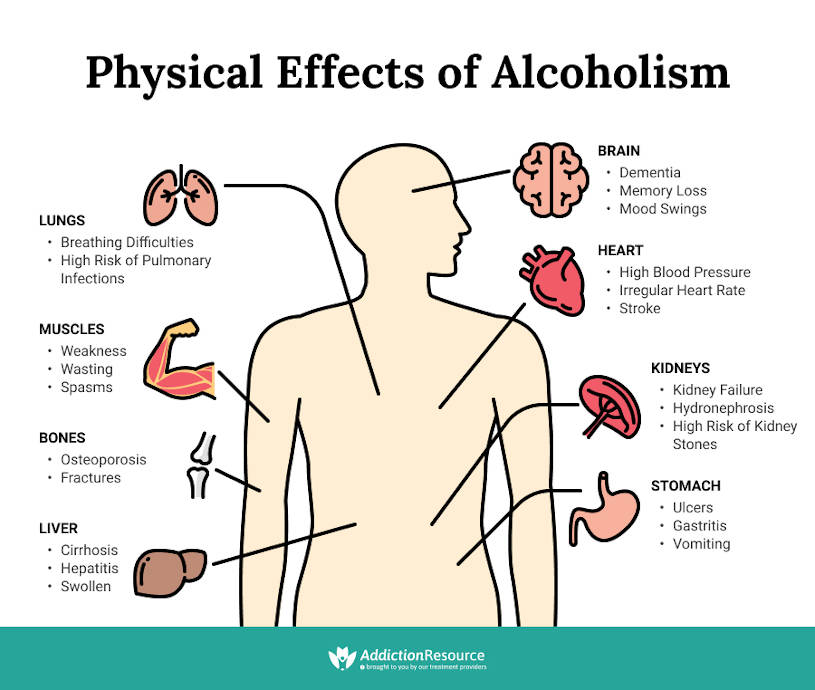
Every year, millions of people in the U.S. experience diagnosable symptoms of alcoholism. People addicted to drinking typically undergo a range of severe effects of alcohol on the body in their day-to-day physical well-being. Some of these changes appear in a brief period, while others develop over months or years.
Table Of Contents:
The physical effects of alcohol can lead to severe health problems or even death. However, in people who receive treatment and establish abstinence, some of the problems triggered by chronic heavy drinking may ease in severity over time.

Physical Effects of Alcohol on The Body
Beer, wine, and hard liquor products all contain a substance called ethyl alcohol. While these products enjoy full social acceptance, ethyl alcohol itself is poisonous to the human body. Unlike food, this substance does not get broken down by the digestive system. Instead, it passes directly into the bloodstream.
Four Main Organs Bear the Brunt of the Harmful Effects of Alcohol on the Body:
- The liver
- The heart
- The brain
- The Pancreas
The liver carries responsibility for breaking alcohol down and eliminating its byproducts from the bloodstream as rapidly as possible. However, in an hour, this organ can only process the amount of pure alcohol in one standard drink (approximately 14 grams). Anyone who imbibes at a faster pace will be exposed to the substance’s potential harms.
In the heart, excessive drinking can disrupt the electrical signaling system that makes the organ function. In turn, this disruption can lead to a reduction in vital blood flow. Any part of the body that doesn’t receive enough blood can sustain damage due to insufficient nutrients or oxygen.
Inside the brain, all alcoholic beverages slow down the standard rate of activity between the nerve cells (neurons) that provide incoming and outgoing communications pathways. If this rate falls below a sustainable point, the brain will stop sending an adequate number of signals to the lungs, heart, and other vital organs. The term used to describe this dire situation is alcohol poisoning.
The pancreas, which is part of the digestive system, is responsible for regulating the body’s blood sugar levels. Long-term alcoholism can cause the blood vessels around the pancreas to swell and cause pancreatitis, which is one of the effects of alcohol on the body. If left untreated, it increases the risk of developing pancreatic cancer, which is a rapidly-spreading and deadly type of cancer. Drinking long-term can impact the pancreas in a negative way, which can cause lasting health complications.
In a person who establishes a pattern of heavy drinking, alcohol-related changes in the brain also set the stage for the development of alcoholism. This situation occurs when the brain grows accustomed to the chemical alterations triggered by alcohol’s presence and produces a strong, adverse reaction when the substance levels fall too low. The long-term effects of alcohol on the body and brain explain the condition’s accepted medical standing as a chronic brain disease.
Short Term Effects of Alcohol Consumption on The Body
The short-term effects of alcohol use appear after just a few drinks. However, people who have low tolerance levels—first-time drinkers or those with a specific genetic makeup—may be affected after having only one drink. Some of these effects might seem harmless, but they are signals that drinking is taking effect in the body.
The Short term Effects of Alcohol Use and Abuse Include:
- Feelings of Relaxation: A feeling of “loosening up” and a sense of euphoria accompany the first few drinks. This is high that people crave and the reason many people turn to intoxicants when they feel stressed and depressed.
- Vomiting, Nausea, and Diarrhea: Liquor can irritate the stomach’s lining and triggers these symptoms, which may become severe if drinking continues, not only during hangovers.
- Shallow Breathing: Alcohol is a central nervous system (CNS) depressant. It inhibits (slows) various physiological functions, including breathing and heart rate. During episodes of severe binge drinking, these effects could be life-threatening.
- Slower Reflexes and Impaired Hearing and Vision: The initial stimulatory effect of drinking soon wears off. Because the CNS controls the senses and motor functions, drinking decelerates the brain’s reaction time. The effects include slower reflexes, slurred speech, reduced hearing, and clouded eyesight.
- Fatigue and Sleepiness: Because booze is a depressant, it has a calming effect. After the initial high wears off, weariness and drowsiness usually set in.
- Blackouts and Memory Lapses: These side effects of alcohol abuse are common among heavy drinkers. Often binge drinkers have no memories of their behavior and are surprised to find they were involved in arguments or even physical altercations.
- Clouded Thinking and Loss of Inhibitions: Neural impairment is experienced by those under the influence, reducing inhibitions, distorting perception, and undermining the ability to think clearly and rationally. This can lead to risky, aggressive, or dangerous behavior, which may seem completely out of character in an otherwise easy-going individual.
- Mood Swings: The initial effects of drinking alcohol include releasing endorphins and dopamine in the brain, which creates a head rush that problem drinkers come to crave. But this effect is temporary, and eventually, dopamine and endorphin levels will crash—and the moods of alcoholics or binge drinkers will come crashing back to earth right along with them. Depression in alcoholics can become chronic, and when it reaches extreme levels, it can trigger suicidal thoughts as one of the short-term effects of alcohol.

Long Term Effects of Alcohol on the Body
Continuous, heavy, habitual drinking takes a toll on the human body. As a result of their self-destructive behavior, alcoholics may suffer dire long-term alcohol effects that produce irreversible consequences.
Some of the Long Term Effects of Alcohol on the Body Include:
- Increased Tolerance. As the brain and body adjust to continuous drinking, tolerance gradually builds, and the problem drinker will have to consume more and more liquor to achieve the same effects. This is a recipe for alcoholism, which will inevitably develop as drinking behavior escalates. Rising alcohol consumption also increases the risk of alcohol poisoning and overdose, which can be fatal.
- Potentially Harmful Withdrawal Symptoms. Patterns of prodigious consumption can trigger intense withdrawal symptoms should the alcoholic attempt to stop drinking. The most severe of these symptoms is delirium tremens (DTs), a medical emergency and can be deadly if it is not treated promptly.
- Obesity: studies suggest that drinking can increase the risk of being obese, which can cause various other health complications.
- Increased Risk of Developing Diabetes. Chronic liquor consumption increases the risk of type II diabetes. Liquor is loaded with carbohydrates and can contribute to obesity while also decreasing insulin sensitivity (insulin regulates blood sugar levels) as it damages the pancreas, the insulin-secreting organ of the body. Diabetes is a frequent companion of heavy drinking and can be especially dangerous in older alcoholics.
- Liver Damage. Drinking damages the liver and can cause cirrhosis or liver cancer. Alcohol-induced liver disease is responsible for one-third of liver transplantations in the U.S., and close to 50 percent of cirrhosis fatalities can be directly linked to heavy drinking.
- Chronic High Blood Pressure. Problem drinkers have consistently elevated blood pressure, at well beyond the danger zone. Chronic high blood pressure damages the kidneys, heart, and arteries and increases stroke and heart attack risk.
- Damage to the Heart. Drinking damages the heart by boosting heart rate, blood pressure, and the levels of certain fats in the bloodstream. As a result, chronic alcoholism dramatically increases cardiovascular disease risk such as cardiomyopathy, irregular heartbeat, etc.
- Stomach and Intestinal Ulcers. Massive quantities of booze consumed over time can have a corrosive effect on the interior of the body, leading to ulcers that may ultimately burst and put the drinker’s life in danger.
- Increased Risk of Some Forms of Cancer: The negative health effects of alcohol abuse are many and myriad, and the list includes an increased risk for cancer of the mouth, throat, breast, liver, and colon.
- Lasting Brain Damage. Excessive drinking causes a loss of brain cells, which results in decreased brain mass. Eventually, this deterioration and its associated effects can provoke alcohol-related dementia, a severe disease that mimics Alzheimer’s.
- Reproductive Health: drinking too much can have a negative impact on reproductive and sexual health. It can cause problems like erectile dysfunction, irregular menstruation, and reduced fertility.
- Bone Health: Drinking can disrupt Vitamin D production, which is essential for calcium to be absorbed by the bones. Lack of calcium increases the risk of osteoporosis and can cause bone fractures and serious disabilities.
- Respiratory Infections: Excessive drinking can decrease respiratory rate, airflow, and oxygen transport, thus causing conditions like aspiration pneumonia, obstructive sleep apnea, reduced pulmonary defense against infections, and acute respiratory distress syndrome.
- Memory loss is also one of the long-term effects of alcohol.
In a worst-case scenario, if one does not stop their excess drinking, their organs may start to shut down, causing coma and eventually death.
There is also another kind of alcohol drink that is even worse. Some people might drink rubbing alcohol believe it is ok, the results of this can be very bad.

Long-Term Psychological and Neurological Effects of Alcoholism
Chronic alcohol consumption damages brain cells, sometimes permanently. By nature, liquor is neurotoxic, and long-term consumption can have a dramatic impact on brain functioning and psychological wellness.
Some of the Severe Conditions or Alcohol Effects Include:
- Mild to Severe Cognitive Impairment: Continuous and uncontrolled drinking can cause memory problems and learning difficulties. Over time dementia may develop if the alcoholic refuses to seek help for their condition.
- Mental Disorders: Chronic alcohol consumption increases the risk of developing mental health conditions like depression or anxiety disorders. In other instances, people may drink to escape the symptoms of their already-existing mental illness like bipolar disorder. Still, in the long run, booze will only make their symptoms more debilitating.
- Wet Brain Syndrome: it is a neural disorder that occurs in up to 80 percent of alcoholics. It is caused by a deficiency of thiamine or vitamin B1, which is one of the side effects of alcohol abuse. Alcoholics tend to ignore their diets, which can lead to thiamine deficiency, but chronic drinking also impairs the body’s ability to absorb thiamine from the usual food sources. If not treated, wet brain syndrome can cause permanent neurological damage, including severe learning difficulties and memory problems that may render the person incapable of living independently.
- Hepatic Encephalopathy: Alcohol damages the liver, the organ responsible for breaking down toxins and excreting them from the body. Poor liver function can cause a buildup of poisons like ammonia and manganese, which can migrate to the brain and damage neural cells severely enough to cause cognitive dysfunction. There is a high risk for a condition called hepatic encephalopathy, a neuropsychiatric disorder that causes changes in mood, personality, and motor functioning. In severe cases, hepatic encephalopathy sufferers may slip into a coma.
- Fetal Alcohol Syndrome (FAS): FAS is a lifelong developmental disorder that occurs in children who have been exposed to liquor in utero. It can cause stunted growth, abnormal facial features, and mental, emotional, behavioral, and cognitive impairment consistent with damage to the central nervous system. FAS is one of the most devastating side effects of alcohol, and it is a risk faced by any pregnant woman who chooses to drink.
- Epilepsy: Scientists say that alcohol abuse can be a factor in developing epilepsy in people or worsening seizures.
- Development of Mouth, Ovaries, Breast and Prostate Cancer. Breast cancer development risks are 40-100% higher than in people who do not consume alcohol.
- Pancreatitis: Drinking can cause pancreatic production of harmful substances, which leads to the inflammation of the pancreas – called pancreatitis.
- Osteoporosis: Liquor triggers certain hormone changes and throwing off calcium levels that prevent the body from building new bones. This results in the bones getting thin and fragile, a condition called osteoporosis. Liquor also interrupts the blood flow to the muscles, which gets in the way of essential proteins for healthy muscles. With time, bone health deteriorates, and muscles become weak with lower mass.
- Co-occurring Drug Addiction: Alcoholism alters the brain’s reward circuitry, boosting the production of pleasure-inducing neurochemicals like dopamine and endorphins. Other drugs cause the same effects, and alcoholics who come to crave feelings of intoxication and euphoria may be drawn to other substances that fill their psychological need to get high. Alcoholics also exhibit poor judgment in general, making it more likely they will experiment with illicit drugs.
Psychological Long-Term Alcohol Effects
Other behavioral, emotional, and psychological long-term alcohol effects may include:
- Changes in sleeping patterns
- Swings or shifts in mood and personality
- Shortened attention span
- Problems with coordination
- Violent behavior
- Inability to speak or think coherently
- Low self-esteem
- Thoughts of suicide or suicide attempts
- Dry drunk syndrome
Alcoholism impacts the mind and body in profoundly negative ways, and no one who drinks to excess will escape the consequences of that behavior.
Overcoming the Effects of Alcoholism
Alcoholism affects people from all backgrounds and all walks of life, and no one who drinks is immune from the threat. In 2016, results obtained during the National Survey on Drug Use and Health showed that 136.7 million Americans aged 12 or older were current alcohol users. That included 65.3 million admitted to binge drinking and 16.3 million who reported heavy drinking within the past month. Some of these people were drinking even at their workplaces.
These numbers reveal the depth of America’s collective descent into risky alcohol-related behavior. For those who’ve fallen victim to addiction, their best hope for recovery is to seek professional assistance from trained addiction specialists to treat the effects of alcoholism.
If one has an alcohol problem, they shouldn’t be ashamed to ask for assistance, and one should ask now before it is too late. Detox and addiction rehab centers offer recovery programs that can help even the most desperate individuals overcome their alcohol dependency. Regardless of the nature and severity of drinking problems, they can help a victim of addiction and manage alcohol effects.
Hope Without Commitment
Find the best treatment options. Call our free and confidential helpline
Most private insurances accepted
Find Drug Rehabilitation Centers Near You Anywhere In the US
Addiction Resource team has compiled an extensive list of the top drug rehabilitation facilities around the country. Use our locator tool to find the best centers near you.
Page Sources
- Key Substance Use and Mental Health Indicators in the United States: Results from the 2016 National Survey on Drug Use and Health, https://www.samhsa.gov/data/sites/default/files/NSDUH-FFR1-2016/NSDUH-FFR1-2016.pdf
- Healthdirect, How Alcohol Affects Your Health, https://www.healthdirect.gov.au/how-alcohol-affects-your-health
- Harvard Health Publishing, Robert H. Shmerling, Sorting out the health effects of alcohol, https://www.health.harvard.edu/blog/sorting-out-the-health-effects-of-alcohol-2018080614427
- Centers for Disease Control and Prevention, Alcohol Use And Your Health, https://www.cdc.gov/alcohol/fact-sheets/alcohol-use.htm
- National Institute on Alcohol Abuse and Alcoholism, Alcohol's Effects On The Body, https://www.niaaa.nih.gov/alcohols-effects-health/alcohols-effects-body
- Australian Government, Department of Health, What Are The Effects Of Alcohol, https://www.health.gov.au/health-topics/alcohol/about-alcohol/what-are-the-effects-of-alcohol
- G. A. Barclay, J. Barbour, S. Stewart, C. P. Day E. Gilvarry, Adverse physical effects of alcohol misuse, 2018, https://www.cambridge.org/core/journals/advances-in-psychiatric-treatment/article/adverse-physical-effects-of-alcohol-misuse/712D871F7C2B7B1C1285A6359189EA31
- Marsha E. Reichman, Joseph T. Judd, Christopher Longcope, Arthur Schatzkin, Beverly A. Clevidence, Padmanabhan P. Nair, William S. Campbell, Philip R. Taylor, Effects of Alcohol Consumption on Plasma and Urinary Hormone Concentrations in Premenopausal Women, 1993, https://academic.oup.com/jnci/article-abstract/85/9/722/908794
- S H Stewart, P R Finn, R O Pihl, The effects of alcohol on the cardiovascular stress response in men at high risk for alcoholism: a dose response study, 1992, https://www.jsad.com/doi/abs/10.15288/jsa.1992.53.499
- Jan Eggert, Holger Theobald, Peter Engfelt, Effects of alcohol consumption on female fertility during an 18-year period, 2002, https://www.sciencedirect.com/science/article/abs/pii/S0015028203027171
- Paolo M. Suter, Erik Häsler, Wilhelm Vetter, Effects of Alcohol on Energy Metabolism and Body Weight Regulation: Is Alcohol a Risk Factor for Obesity?, 1997, https://academic.oup.com/nutritionreviews/article/55/5/157/1813978


 Reviewed by:
Reviewed by:  Written by:
Written by: 

 FindTreatment.gov
FindTreatment.gov